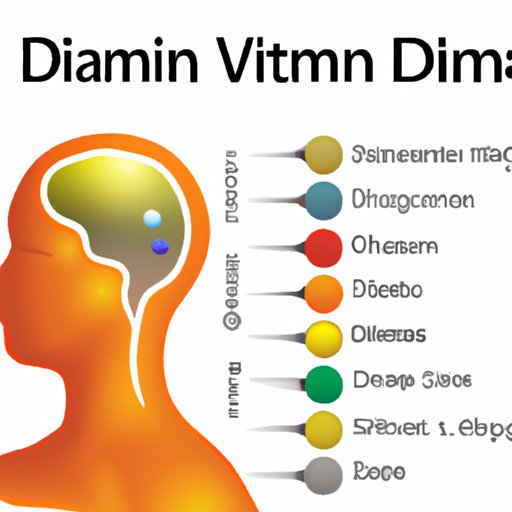
Introduction
Vitamin D is an essential nutrient required by the body for optimal health, growth and development. It plays a crucial role in the absorption of calcium and phosphorus, promoting strong bones and teeth. Besides bone health, vitamin D is also important for proper immune function, mental health, and the prevention of chronic diseases. However, studies have shown that most people do not get enough of this vitamin, leading to a silent epidemic of vitamin D deficiency. Recognizing the symptoms of vitamin D deficiency is important to catch the condition early and prevent complications associated with it.
10 Common Symptoms of Vitamin D Deficiency: What You Need to Know
Vitamin D deficiency can cause a range of symptoms that vary from person to person, but some symptoms are more common than others. The following are the 10 most common symptoms of vitamin D deficiency:
- Bone pain and muscle weakness
- Fatigue
- Depression or anxiety
- Hair loss
- Slow wound healing
- Frequent infections
- Difficulty thinking clearly or concentrating
- Unexplained weight gain or weight loss
- Restless sleep or insomnia
- Dizziness or lightheadedness
It is important to note that these symptoms can be attributed to several other conditions, making it difficult to diagnose vitamin D deficiency based on symptoms alone. But if these symptoms persist, getting tested for vitamin D deficiency is a good idea.
The Silent Epidemic: Recognizing the Signs of Vitamin D Deficiency
Vitamin D deficiency is often called the silent epidemic because it can go unnoticed due to its subtle symptoms that are often ignored. Many people may attribute their symptoms to aging or lack of sleep and overlook the possibility of nutrient deficiency. Some of the less obvious symptoms of vitamin D deficiency include:
- Restless sleep or insomnia
- Mood changes, including irritability and anxiety
- Chronic pain
- Impaired wound healing
- Increased risk of falls and fractures
- Incontinence
The above symptoms can be a sign of other underlying conditions, but it is always important to check if vitamin D levels are adequate.
Feeling Unwell? It Could be a Vitamin D Deficiency – Here are the Symptoms
Vitamin D deficiency can be the cause of many symptoms that people may not associate with nutrient deficiency. Here are some of the more unique symptoms of vitamin D deficiency:
- Excessive sweating, especially on the forehead and head
- Brittle nails
- Chronic fatigue and tiredness
- Frequent headaches
- Difficulty controlling blood sugar levels
These symptoms may not be explicitly associated with vitamin D deficiency, but research suggests a link between these symptoms and lower levels of vitamin D. If you have any of these symptoms, it’s essential to consult with a healthcare provider and get tested for vitamin D deficiency.
From Fatigue to Hair Loss: A Comprehensive Guide to Vitamin D Deficiency Symptoms
Vitamin D deficiency can manifest in different symptoms across various body systems. Here’s a comprehensive guide to vitamin D deficiency symptoms:
- Skeletal system: bone pain, muscle weakness, and osteoporosis
- Immune system: increased susceptibility to infections and slow wound healing
- Endocrine system: fatigue, insulin resistance, and weight management issues
- Neurological system: mood disorders, insomnia, and cognitive impairment
- Hair and skin: hair loss, psoriasis, and eczema
- Cardiovascular system: hypertension, atherosclerosis, and heart failure
It is essential to recognize the symptoms of vitamin D deficiency and understand how they can impact different systems in the body. Seeking treatment early can help mitigate complications associated with vitamin D deficiency.
Is Your Body Trying to Tell You Something? Learn to Identify Vitamin D Deficiency Symptoms Today
Vitamin D deficiency can have severe consequences if left untreated. Recognizing the symptoms is critical to getting early treatment before complications arise. Here are some key takeaways:
- Vitamin D deficiency is prevalent in many parts of the world and can be attributed to several factors.
- Symptoms of vitamin D deficiency can vary from person to person, making it difficult to diagnose based on symptoms alone.
- Early recognition of vitamin D deficiency can prevent complications.
- Getting adequate sunlight, eating vitamin D-rich foods or taking supplements can help prevent a deficiency.
If you suspect that you have vitamin D deficiency, make an appointment with your doctor to get tested today.
Conclusion
Vitamin D is essential for good health, growth, and development. The consequences of vitamin D deficiency can be severe if left untreated. Recognizing the symptoms of vitamin D deficiency is vital to prevent complications. By getting adequate sunlight, consuming vitamin D-rich foods or supplements, maintaining a healthy weight, and leading a healthy lifestyle, you can keep your vitamin D levels within the recommended range and maintain optimal health.





